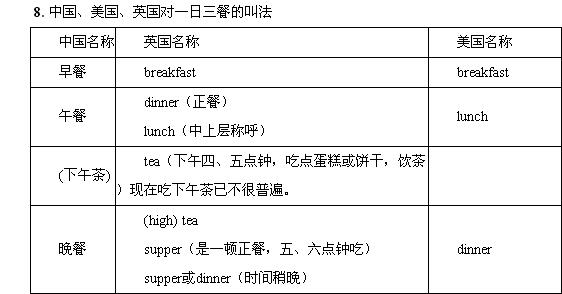表示“一日三餐”名词的用法
1. 在通常情况下,表示一日三餐的 breakfast, lunch, supper前不用冠词。如:
Breakfast is served until 9 a.m. 早餐一直供应到上午9点。
Can you manage lunch on Tuesday? 你星期二能来吃午饭吗?
与介词after, at, before, for, over, since, without等搭配时,通常也不用冠词。如:
I often nod off for a little while after lunch. 我在午饭后常睡一小觉。
At breakfast this morning he said that he would be very busy today. 今天早餐时,他说他今天会很忙。
Please make your beds before breakfast. 请在早饭前把床铺好。
I nearly always go home for lunch. 我差不多总是回家吃午饭。
She scanned the newspaper over breakfast. 她吃着早饭把报纸大略看了一遍。
I haven’t eaten since breakfast. 我吃了早饭后到现在还什么都没吃呢。
I had to go without breakfast this morning as I was in a hurry. 我今早很匆忙,只好不吃早饭了。
有时介词at与介词during意思相同。如:
It happened at [during] lunch. 此事发生在吃午饭的时候。
2. 若是特指某一顿早、中、晚餐,则可在其前加定冠词或甚至其他限定词。如:
Thank you for the breakfast. 谢谢你的这顿早餐。
Let’s get the supper ready. 咱们把晚饭准备好。
After that breakfast, I never saw her again. 吃了那顿早餐后,我就再没有看到过她。
3. 若受到描绘性定语的修饰且表示非特指,其前通常要用不定冠词。如:
We had a working lunch. 我们吃了一顿工作午餐。
I only want a small supper. 晚饭我只想吃一点东西。
He takes a packed lunch to work every day. 他每天带(盒装)午饭上班。
After a quick breakfast, he hurried to the station. 匆匆忙忙吃完早餐,他就赶到车站去了。
The walk is expected to last all day so bring a packed lunch. 预计要走一天,所以要带份准备好的午饭。
We were well primed for the journey with a large breakfast. 为了去旅行,我们早餐都吃得饱饱的。
4. 表示一日三餐的名词通常是不可数的,所以当要表示一日三餐具体的“量”时,可用some, much, little等修饰。如:
She doesn’t eat much breakfast. 她早点吃得不多。
She always eats very little supper. 她晚饭总是吃得很少。
We made ourselves some breakfast. 我们自己做了点早饭。
当然,也可不直接用 much, little 等修饰,而换用其他表达。如:
She never eats much for breakfast. 她早点从不多吃。
5. 虽然表示一日三餐的名词不可数,但有时为了强调不同种类的饭餐或不同人食用的饭餐时,也可使用复数形式。如:
Does this pub provide lunches? 这家酒馆供应午餐吗?
Free school lunches are given to children who qualify. 符合条件的儿童可享受免费的午餐。
如果受到these, those等的修饰,自然也要用复数。如:
I’m used to wine with my meals, so I find these lunches rather unsatisfying. 我习惯于吃饭时喝葡萄酒,因此我觉得这些午饭相当不令人满意。
6. 表示“吃”早餐、中餐或晚餐,英语通常用 have。如:
They were having breakfast when I arrived. 我到达时,他们正在用早餐。
He suggested that we have lunch at the hotel. 他提议我们在宾馆吃午饭。
其实也可用 take 或eat(只是相对来说较少见而已)。如:
Won’t you stay and take lunch with us? 留在这儿吃午饭好吗?
We hardly had time to eat breakfast. 我们简直没有时间吃早饭。
根据情况可搭配其他动词。如:
Who is making [getting] breakfast? 谁在做早饭?
She ordered lunch for 1.30. 她定了午餐, 在1时30分开饭。
They provided breakfast as well as dinner. 他们提供早饭和晚饭。
Four waiters served us lunch. 有四个服务员招待我们吃午饭。
7. 表示一日三餐的名词有时可用于另一名词前作定语。如:
Orange juice is a popular breakfast drink. 橙汁是受欢迎的早餐饮料。
Americans love breakfast cereals in the form of flakes. 美国人喜欢薄片状的谷类早餐食品。
She included some chocolate in each child’s lunch bag. 她在每个孩子的午餐包里加了一些巧克力。
An older boy intimidated the little children when he took their lunch money. 一个年龄大一点的男孩恐吓那些小孩,并且拿走了他们的午饭钱。
8. 中国、美国、英国对一日三餐的叫法



















